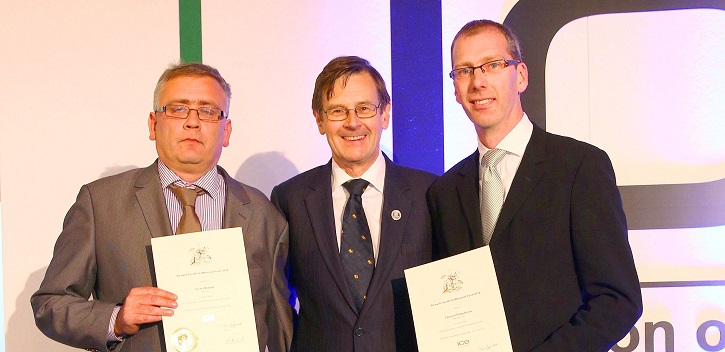UCC academics engineer success

UCC academics Dr Edmond Byrne (School of Engineering) and Dr Gerard Mullally (Department of Sociology) have been awarded the Richard Trevithick Memorial Prize (2015) by the Institution of Civil Engineers (ICE).
The award was presented at the ICE headquarters at One Great George Street, London by the President of the Institution, Professor David Balmforth.
The Trevithick Prize is awarded from the Richard Trevithick Memorial Fund, a fund established in 1888 in memory of Richard Trevithick (1771-1833) and which was also used to provide a memorial window in Westminster Abbey. The balance, accepted in trust by the ICE, is used to fund this annual award.
Richard Trevithick was a mining engineer who played a key role in laying the basis for the industrial revolution. He developed the world’s first high-pressure steam engine and subsequently the first full-scale railway steam locomotive, launched in Merthyr Tydfil in 1804.
The 2015 Trevithick Prize was awarded on the basis of a joint paper by Drs Byrne and Mullally, ‘Educating engineers to embrace complexity and context’. The paper was published in the Proceedings of the Institution of Civil Engineers - Engineering Sustainability, the result of pedagogical research undertaken on a common first year engineering module Professional Engineering Communication and Ethics which Dr Byrne teaches on and coordinates.
The accompanying Proceedings Editorial commented:
"...the approach taken in Cork has demonstrated that it is possible to sensitise young engineers to the dimensions of modern day challenges that lie beyond the technical realm. In my view at least, Cork’s students are being prepared for a world that is increasingly connected and increasingly collaborative; for a fulfilling and successful public and private life."
The award is made by the ICE annually to ‘authors from both industry and academia who have produced work judged by their peers to be of exceptional quality and benefit to the civil engineering and science community’. Consequently, the work has been made free to view on ICE Virtual Library as part of the institution’s commitment to furthering knowledge and best practice in civil engineering.
